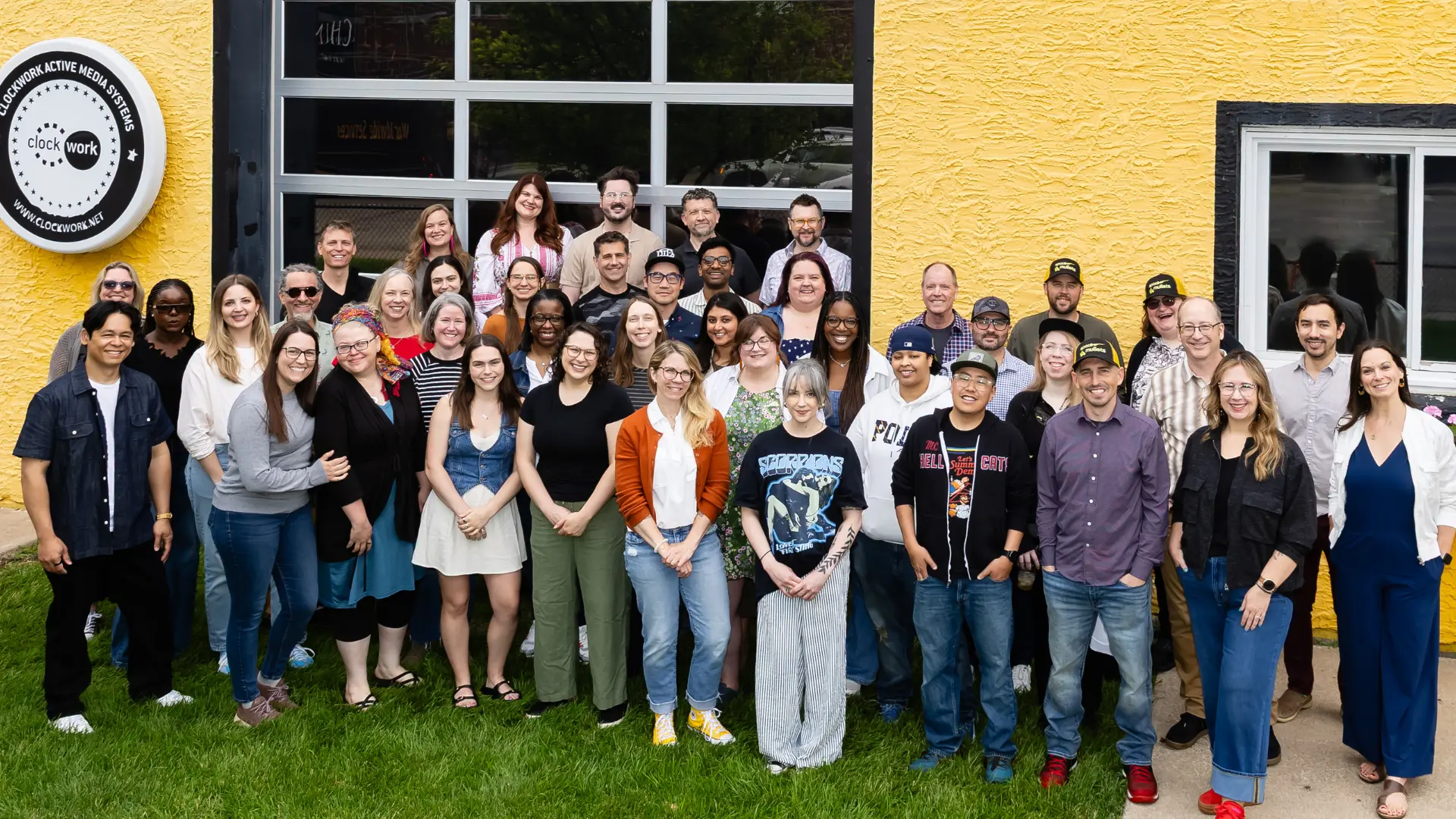When it comes to building a new website or migrating an existing website, you have a lot of options. From the content management system to the hosting platform to larger technology decisions about integrations and plugins. And on top of that, who to work with to get it all done right.
We’re here to help. As a technology objective agency, we spend a lot of time evaluating and recommending technologies that best fit clients’ needs. Every technology has features that make it great and features that might not be the right fit. Our job is finding the right fit.
We often recommend WordPress as a content management system to clients.
So, why use WordPress? Here are nine reasons why.
WordPress has a large ecosystem
WordPress powers about 30% of the websites on the internet. This means a lot of businesses and people use it. It also means a lot of developers and designers work with it. Likewise, it means a lot of plugins and APIs are built for it to ensure that these businesses can operate in efficient and productive ways.
Whatever situation you’re encountering when it comes to getting your website built for your needs, it’s likely that someone else has probably encountered that same situation before (there are no new problems, right?). Perhaps you’re trying to integrate a marketing automation platform like MailChimp with your website, more often than not, it’s as simple as downloading the plugin to WordPress and connecting your account.
With WordPress, you can gain efficiencies from the large ecosystem of developers, and the support system that goes along with that.
You will have independence from your developer, or digital agency
The more people who are familiar with the content management system you choose, the greater freedom you have. You won’t be tethered to a singular person or small group of experts, nor will your code base be so customized that someone new can’t come in and help out. This makes your digital properties more nimble — need something new? There’s probably someone who can help.
The platform will be maintained
Technology is a big choice, and it’s an important one. You will be tied, for at least a period of time and investment, to your selection. For this reason, the maintainability of your technology is an important quality to assess.
Given the scale of the WordPress community, the platform isn’t going to just go away. It also probably isn’t going to stagnate when it comes to new features or improvements. This probability is passed along to you as a business owner.
You can participate in the tech community
WordPress is an open source software operated by Automattic. The founder of Automattic has said, “We don’t make software for free, we make it for freedom.” That mentality is built into the platform and the community around it.
As Jeffrey Smith, one of our software engineers said, “WordPress is a great way to get involved in the tech community, even without technically getting involved.” There is a halo of events and communities around WordPress that users are indirectly supporting by using the platform. For example, there are numerous Wordcamps throughout the country and several meetups in nearly every major city in the U.S. (and abroad). Like the points above, you and your business can benefit from the large community, you can also be “giving back” by being a part of it.
For example, we had a recent client that required our custom software solution we built for them also be released into the WordPress plug-in directory or made available as open source code. By doing this, they are giving the community access to intellectual property and sharing the investments they’ve made.
Open source is a value, not just a feature
Another benefit of open source software is that the power isn’t tied up in one organization — and into one organization’s roadmap and financial plan. Yes, Automattic operates WordPress, but the platform and its code is available via GPL for any developer to access. (the GPL is a free software license, which guarantees end users the freedom to run, study, share and modify the software.)
When it comes to their software Automattic has also said, “Our common goal is to democratize publishing so that anyone with a story can tell it, regardless of income, gender, politics, language, or where they live in the world.” That’s a lofty mission with which developers and businesses can identify.
An open source platform attracts talent
Have we beaten the open source drum enough?! Not quite yet. One last advantage of using open source software is that it’s attractive to software engineering talent. Most developers have learned a lot from open source communities. These communities are a way for them to draw on the experience and expertise of peers who aren’t necessarily their colleagues.
The flipside of their experience is that developers often want to give back to those open source communities as well, and clients can leverage that enthusiasm to drive new solutions. For WordPress in particular, someone working on the project might be eager to tackle a new problem with an intention of sharing the solution with the community (like the example above).
Their next update is going to be great
Gutenberg, WordPress’ next big update, is going to be great for website editors and managers. True to their transparent values, they built it in front of their community and gave users access to beta versions. This means it will be very stable and well-vetted from a functionality standpoint as well as a code base standpoint. This is an incredibly valuable approach to what’s certainly going to be a significant release.
Apart from the smart way WordPress has been building the update, the update itself is going to be an improvement from an experience perspective. WordPress started as a blogging platform, not a content management system, but over the years it has come to be used as a CMS. With this update, they seemed to ask, “how can we make good content management a native part of WordPress?” They are integrating their answer into their core product, rather than developing a set of plug-ins, which is a smart move. We’ve experimented with the beta version and we’re totally on board with their new design.
WordPress has years of experience and transparency
WordPress has a long history, this is a benefit when it comes to learning from lessons and planning for the future-state of the product. As with any product development, knowing what approaches didn’t work or what plans fell short is an important aspect of institutional knowledge. New companies often don’t have those layers to help drive their product strategy.
When looking at the vision and product roadmap, which they share, you can trust that the direction is thought through and the features and technology are extendable. This trust and transparency is a valuable asset because your website is likely one of your most valuable assets. Understanding any planned technical changes can give you peace of mind, and can help your team also plan.
Integrations that work with your current business
Due to the scale of its ecosystem, which we talked about, there are a vast number of other technologies that already integrate with WordPress. In the integration section of the WordPress website, there are 11 pages of available integrations. From eBay to forms to backend technology that makes your site run better, these tools are already available to use. This eliminates the need to build them yourself or customize to accomplish your goals.
And, now for some common objections to WordPress as a content management system
It’s open source
You might be asking yourself, “this is both an argument for and against WordPress?” Yes, but stick with me.
One objection to open source software suggests that it’s more vulnerable to security and stability threats because it’s codebase is, well, open. This means hackers can easily download the platform foundation and find hacking opportunities.
The first counterpoint is that most technology isn’t secure. Hardly a comfort, I know, but it’s true. Closed or open, software is a human-made thing that has vulnerabilities. We’ve seen incidents happen to some of the best technology. So what you want as a user is a level of trust not just in the product, but in the ability of that product to make a fix once it’s broken. That’s where the WordPress community comes in again. With as many users and fans as WordPress has, security issues are fixed rather quickly.
The second counterpoint is that security can be improved if you work with a great hosting provider and implement WordPress in a smart way. We work with Pantheon, Flywheel, and WordPress VIP, among others. We rely on those platforms to do the stuff they do well (security, for example) so WordPress doesn’t have to carry that load.
Usability isn’t great
Admittedly, when you start talking to some people about WordPress, you can hear horror stories; that’s all due to bad implementation. WordPress isn’t hard to use unless the team building your site didn’t do a good job designing how to use it. When it comes to technology solutions, there are a lot of human experiences to consider. The most common is the end user, but an equally important person to consider is the website editor or manager. The person doing all the things on the backend to power a great user experience.
That’s when working closely with a professional agency is helpful. Because they look at it differently than a standalone developer does. You want a partner who thinks about more than just getting something to show up on the screen, that’s the (relatively) easy part. You need a good implementation strategy and a human-focused approach to building the tool.
So, why use WordPress? WordPress is a great choice for a lot of use cases
WordPress gives you the ability to do custom design and has a lot of integrations available, too. It’s a flexible tool that allows you to make it what you need it to be. But sometimes that flexibility is what gets in the way of a smart implementation. As a business, it is best to roadmap and prioritize immediate needs against a long-term vision and consider that when building. In the end, success rests on how you design your digital experience.




